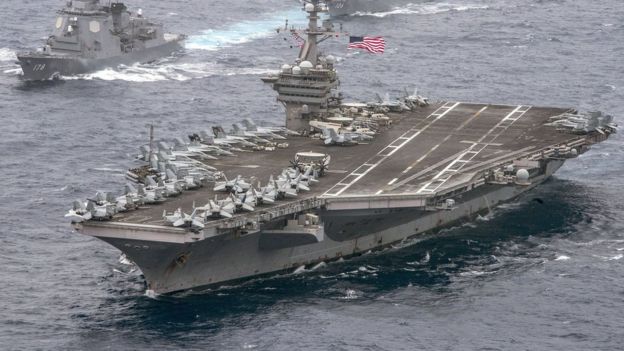Superpower Status Nuclear-Powered Competition

"China now has the capability to directly threaten our homeland from a ballistic missile submarine. That's a pretty watershed moment.""China is on a trajectory to be a strategic peer to us by the end of the decade. So, for the first time ever the U.S. is going to face two peer-capable nuclear competitors in Russia and China who are different, who you have to deter differently.""We have never faced that before."Admiral Charles Richard, Commander, U.S. Strategic Command"The U.S. armed forces are now preparing for an age of great-power competition and rightly so. The 2018 National Defense Strategy shows the Defense Department is focused on the threats posed by Russia and especially China to U.S. interests, allies, and established partners such as Taiwan."?For now, U.S. forces appear poorly postured to meet these challenges. That’s because both Russia and China have developed formidable networks of missiles, radars, electronic warfare systems, and the like to degrade and potentially even block U.S. forces’ ability to operate in the Western Pacific and Eastern Europe to defend allies and partners in those regions. China in particular is developing increasingly impressive capabilities to project military farther afield, including through systems such as aircraft carriers, long-range aviation, and nuclear-powered submarines. Together, these forces have tilted the military balance over places such as Taiwan and the Baltic states from unquestioned U.S. dominance to something much more competitive."Elbridge Colby, David Ochmanek, Foreign Policy.com
/arc-anglerfish-arc2-prod-mco.s3.amazonaws.com/public/DMM3RUGSIRER3GZEJ4QTH3UZUU.JPG) |
Three Chinese warships are seen docked at Garden Island naval base in Sydney on June 3, 2019. - Australians were surprised by the sight at Sydney Harbour, forcing the prime minister to reassure jittery residents. (PETER PARKS/AFP/Getty Images) |
China has been busy the world over, for it's an all-consuming target they have set for themselves to change the world order of influence and military strength and dominance in every sphere of human activity that matters. There is one dominant world power at the present time. And another that at one time in recent history shared world dominance with the United States. Now, the long-range plans of the world's most populous nation, the country with the second-largest economy, is to rival and then overtake the United States as sole global superpower.
In expanding in so rapid a manner, the scope and scale of its geography, its maritime and air sovereignty -- despite disputed claims -- through territorial aggression, it has become a formidable competitor to reckon with. China's diplomacy too has turned to bellicose aggression. It uses the power of its trade supremacy as a cudgel to beat other nations into a state of submission. Its tentacles are long and its aspirations as wide as the globe. And nor has it forgotten that space and extraterritorial visions of 'might is right' also beckon.
Admiral Richard, speaking before Congress in September, addressed China's nuclear capability of some 200 nuclear warheads which will double in short order. The U.S. itself has a massive nuclear arsenal of 3,800 warheads. China is intent on moving steadily forward, reality to match aspirations. Its next generation nuclear missile submarines and advanced missiles they are meant to carry could target the U.S. coastline from China's, simplifying moves without advance warning.
 | |
| The US is facing a more robust Chinese presence in the South China Sea Getty Images |
The Pentagon has reported that China has placed silos south of Mongolia whose intended use could be the development of new, solid-fuelled intercontinental ballistic missiles even while it may be constructing new silos in Henan province for liquid-fuelled missiles. All of which are potentials of concern to the United States. Which is pursuing a new arms-control approach for the purpose of establishing a broad "framework" agreement with Russia, hoping to persuade China to join.
For the time being China appears indifferent to negotiations. Its economy is steadily expanding, as is its outreach around the world. The hope, needless to say is that arms-control negotiations may succeed in limiting the world's current superpower and its two competitors' plans to continue investing in military armaments such as maritime hypersonic missiles. In the world's favour is that these huge economies have, through trade established economic interdependent links difficult to extricate themselves from, and useful to preserve.
What the U.S. faces, however, is an undeniable threat, one that regional allies such as Japan, South Korea, Australia, New Zealand, Singapore and India have long recognized in China's ambitious declarations of sovereignty over disputed regions on land and sea and air. Its recent Himalayan dust-up with India, one such adventure. They are each, in turn and comprehensively vulnerable to China's expanding nuclear threat.
Both Russia and China have a practical view of their geopolitics, to enhance their presence in the world order as superpowers. They are impatient to see the U.S. shift over and make room. Russia longs for a return of the 'respect' and recognition it basked in when the USSR was just such a world superpower. China, however, sees its world dominance as merely a matter of time it is swiftly compressing into reality, for this is their destiny.
 |
|
Labels: China, Nuclear Arsenals, Russia, Superpower, Superpower Aspirants, United States
0 Comments:
Post a Comment
<< Home